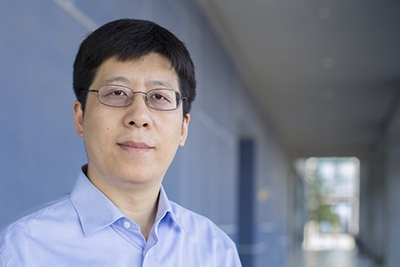Quick Facts:
• The opinions Chinese people have of their government are made worse by romanticized views of the western world.
• Huang’s study is one of the first to show how perception of foreign countries affects opinions of domestic governments.
• In another study, Huang finds governments engage in propaganda as a show of strength, and that propaganda works even when people do not believe it.
September 10, 2015 - Chinese people who have overly rosy views of socioeconomic conditions in the western world tend to have more negative views of their own government — but when their misconceptions of foreign countries are corrected, their opinions about the Chinese government improve.Such is one takeaway from a recent study by political scientist Haifeng Huang of the University of California, Merced.

(Left) Haifeng Huang
Most people in China believe their country lags behind advanced western nations in socioeconomic status, Huang said. But because of the proliferation of misinformation in Chinese media — and, in particular, on the Internet — citizens’ knowledge of foreign countries is limited, and many end up either romanticizing or vilifying them.
Somewhat surprisingly, Huang’s paper — published recently in the American Political Science Review, the flagship journal of political science — shows that those who underestimate foreign socioeconomic conditions, when corrected, generally do not end up with a different opinion of China.
“I think even those people who underestimate foreign countries still know China lags behind,” Huang said.
Social scientists have conducted much research on how people’s knowledge about their own countries affects their individual political opinions. Huang’s study is one of the first to examine how the knowledge about foreign countries affects opinions of domestic governments.
In broad terms, Huang’s recent research focuses on the effects of misinformation, rumor and propaganda in authoritarian nations such as China.
The Chinese government restricts the media and the general flow of information among the public. This leads to widespread mistrust of the government, popularity of alternative but not necessarily reliable information sources, and oversimplified perceptions of foreign countries. Information control often backfires, Huang said.
In a forthcoming article, to be published in the British Journal of Political Science, Huang found that anti-government rumors reduced people’s trust of the government, and rebuttals were typically of limited value in recovering that trust.
And in a previous study, published in the Journal of Comparative Politics, Huang found that college students in China generally were not persuaded by the government’s messages in political education courses, but the propaganda gave them a belief about the capacity of the government for social control.
And that might be exactly the point.
“The question is why governments engage in propaganda when nobody is believing it,” Huang said. “They do these things as a signal of their strength — just to show that they can do them.”
Huang grew up in China and completed his undergraduate education there before heading to UC Berkeley, where he earned his Master of Public Policy degree. He then obtained his Ph.D. in political science from Duke University and worked as a postdoctoral researcher at Princeton before becoming an assistant professor at UC Merced, where he has joined a prolific group of political science researchers.
“I like it here a lot,” Huang said. “Our department is relatively small but quite strong, and my colleagues are very supportive of my research.”
Source: UC Merced








